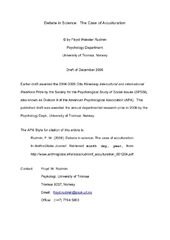Debate in science: The case of acculturation
Author
Rudmin, Floyd WebsterAbstract
The acculturation paradigm of measuring assimilation, separation, integration and marginalization confuses dimensional and categorical conceptions of its constructs, fails to produce ipsative data from mutually exclusive scales, misoperationalizes marginalization as distress, mismeasures biculturalism using double-barreled questions instead of computing it from unicultural measures, and then tends to misinterpret and miscite this faulty science. Extensive published but widely uncited data cast doubt on claims that integration is preferred by minority groups or is beneficial for them. Such salient but unseen problems suggest that the community of acculturation researchers is biased and blinded by an ideology, probably the commendable ideology of liberalism, which advocates freedom of choice, tolerance, plurality, and redress of harm. Phenomenological observations that challenge the paradigm include the absence of studies of majority group acculturation, the well-replicated fact that minorities never prefer pure uniculturalism, the indistinctiveness of cultures, and the predominance of researchers, theory and data from similar Anglo-Saxon settler societies (USA, Australia, Canada).


 English
English norsk
norsk